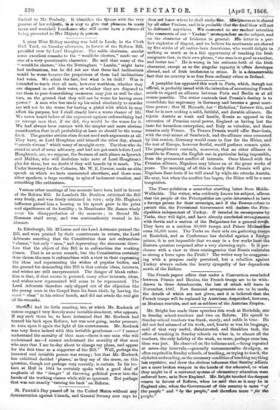A great West Riding meeting was held in Leeds, in
the Cloth Hall Yard, on Tuesday afternoon, in favour of the Reform Bill, presided over by Lord Houghton. The noble chairman, amidst some excellent remarks to the "would-be erectors," made use of one of a very questionable character. He said that many of the "would-be electors," like the Nottingham "Lambs," might have bad inclinations, bat he did not see that those bad inclinations would be worse because the proprietors of those bad inclinations
had votes. We admit the fact, but what is its drift? Was it intended to teach that all men, however worthless, whether they are disposed to sell their votes, or whether they are disposed to use them to pass demoralizing measures, may just as well be elec- tors, on the ground- that they will not be worse for having more power ? A man who has made up his mind absolutely to murder me will not be the worse for having a pistol with which he may effect his purpose, but I shall clearly have a worse chance of life. We never heard before of the argument against enfranchising bad or corrupt men that, if we did, they would be the worse for it. We had always been content with the simpler and more obvious consideration that in all probability at least ire should be the worse for it. The genuine artisan class do not need such arguments at They have, as Lord Houghton said himself the other day, almost "ascetic virtues" which many of as might envy. The class who do stand in need of some advocacy, and had not got mach before Lord Houghton's, are, we suppose, the freemen of such places as Ipswich and Malden, who will deal:Alm take note of Lord Houghton's plea for them, but we doubt if they will benefit by it much. The Under Secretary for the Colonies, Mr. W. E. Forster, made an able speech on which we have commented elsewhere, and there were Other speakers, a large meeting in spite of inclement weather, and something like enthusiasm.






























 Previous page
Previous page